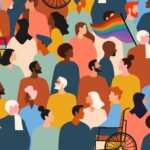One of the main criteria in academia and the media, in general, to be considered a reliable, valid, and credible source is impartial objectivity. Many of us have been taught that if we represent issues through an evidence-based approach that focuses on facts and figures and relies on research to validate each and every statement we make, we’ll be an impartial and objective authors - rendering our content indisputable. But even with this approach, can an author ever truly be objective?
Our audience is filled with young professionals in various different fields, all of whom will in one way or the other be expected to make “objective” decisions, either for research, policy, collaboration purposes, etc. Still, our perception of reality has been so largely influenced by academic knowledge and media discourse.
This process of socialization dictates what we deem as societal norms, the way policies and laws are created, and the virtues of life in the ways we live it as a whole. These are the lenses through which we cultivate our tomorrow and the experiences of our today. Therefore, we must always question what “objective reality” means, as to a large extent this concept does not factually exist. This, furthermore, encourages a narrow and binary way of thinking, which is limiting to a social group’s potential as it denies validation to the experiences of their lived realities and it perpetuates narratives that, ultimately, only benefit one group, i.e.white, cis-het males from Western societies.
“The Basis for Objectivity is the Reality of White Hetero Cisgender Men”
As Nietzsche put it: “There are no facts, only interpretations”. The way we see our reality is the way we’ve been socialized to perceive it. We’ve been socialized to understand that our society functions only if we collectively agree on the same interpretations, and the concept of objectivity reinforces this opinion. Yet, as with everything else, it comes at the expense of underrepresented groups.
During our recent anti-racism week event, a representative of the GFN and co-host of the event, Mallika Sillie said that “the basis for objectivity is the reality of white hetero cisgender men”.
One of the main reasons I believe an author cannot be subjective is this very statement. Due to ages of inequalities, the white hetero cis-man has for too long dictated how we interpret our reality. They interpreted that women’s bodies are of their possession, thus they feel entitled to make decisions on women’s behalf and to treat women as objects. They’ve interpreted that white skin was the (beauty) standard, thus black and brown bodies have been excluded from the media, from fashion, and many other fields. They interpreted that indigenous communities were savages that needed saving from the “civilized” (here read colonizers), thus they erased indigenous people and their culture. The list goes on, but you understand the concept.
So every time we google facts and figures about the human anatomy, the most talented artists, or the most impactful people in history, most of our results are the interpretations of white hetero cis-men. Even the research we use to add validity to our claims is built upon countless researches that exclude and misrepresent different affinity groups in our society.
Authors and Their Subjective Selection
Journalism and the display of relevant information to the public are intended as a public service. One that is not only there to inform but essentially educate us on the world surrounding us and enriches our own realities. In this regard, it is important to reflect on the way news is produced and consumed. Nowadays, most commercial news is not crafted as a public service. Instead, it is designed and packaged to fit into an ever-expanding consumer society within a capitalist system. In this context, mass-produced news becomes a good that needs to be sold on the market of ideas. That is why we have so many clickbait articles alongside flashy, sensationalist cover pages, titles, and headings.
To keep a consumerist audience engaged, there are certain criteria aimed to “satisfy” their need for news, outlining what makes the most important content on the market. A market, which is by default designed by and for white, het-cis Western consumers. If you want to read more about criteria that define newsworthy pieces, make sure to read more on Galtung and Ruge's work in defining the criteria of news.
The Neutrality Argument
But what does being neutral mean? Because in a world where mass and commercial media is owned (here also read funded) and run by people who have historically and up to date been in power socio-economically, then how can it truly be neutral? They are already biased at the source, meaning that already since their conception they can never be truly neutral to their full extent.
It is unrealistic to think there can be neutrality in a narrative that has for centuries been centralized within a niche group of people. It is impossible for there to be any objectivity in a cycle where the rich and powerful control the narrative and as a result become more rich and powerful by controlling the narrative. As a consequence of that cycle mass media and academia have been molded for the benefit and understanding of those in power, thus giving them more power. Think, for instance, about how higher education institutions in The Netherlands so frequently teach cultural awareness through Hofstede’s cultural dimensions, instead of through more diverse sources. Further conditioning students to interpret cultures from a white Western men's point of view. In the same context, how can we expect political neutrality from NOS if the chairman of their supervisory board is a PvDA party member?
So even within the already exclusionary margins of objectivity, there is corruption and bias due to capitalism and other systems of oppression. Narrowing our interpretation of reality to benefit an even more niche group of people.
Objectivity Within Academia
In the field of academic knowledge, we need to talk about knowledge power and superiority. We have all heard the cliche saying that “the victors write history”. And it is highly important to recognize the magnitude of this reality. When we say “victors” we mean colonizers and oppressors on large as well as small scales. And by history we mean not only the historic facts of what has occurred during times of conflict but also moving forward the victors holding the power to perpetuate select virtues in a reality that is meant to shape everyday life.
Merely looking at international relations (IR) we can already assess that the mainstream study focuses on the Westphalian model with the conception of the nation-state, where everything is centered around these events. And while these are historically accurate processes, they lay the sole basis for influencing modern-day political landscapes that inevitably are Eurocentric. Accordingly, pools of knowledge are held by the ones who have the resources and high ground to produce information, to a large extent inspired by colonial and imperial histories.
Beyond IR and in all academic fields, knowledge is power. Therefore, formal education, as well as international media and discourse tropes, essentially have the power to shape the direction of current affairs (politics) and affect all domains of life, becoming a tool to legitimize the realities of people and communities, and in effect delegitimize others’. If one’s reality is merely acknowledged but not legitimized, there are small chances for these groups, may they be BIPOC, LGBTQIA+, Jewish, or any other historically oppressed group, to not live on the margins of society.
That is why we find it absolutely necessary to talk about objectivity in the media, in academia, and in everything these domains inspire in everyday life. Because what is “objective” nowadays is merely a product of the legitimized reality for very few parts of our societies.
So Where Does Objectivity Come From?
The objectivity of academics, journalists, and other professionals was never meant to come from personal characteristics and qualifications alone. Instead, when speaking about objectivity, what is actually referred to are the methods used to collect, compile and analyze data. And even by doing this to the highest degree of methodological objectivity, one can always fall short of their own biases by using framing which aligns with these.
So even in our diligent pursuit of truth through fact-checking and a critical evaluation of the methodology, we are deceived by partial truths and clever use of idioms. For instance, by generalizing attacks done by Muslims as “terrorism” while attributing attacks done by Christians to less villanizing circumstances such as mental health. In the Western context, for example, stating that migration negatively impacts the economy, without acknowledging years of colonization, wars, and the intentional misplacement of people that led to mass migration. By stating that recovering territories contribute the most to climate pollution, without acknowledging how many rich countries send their waste to recovering territories or how these territories do not have the resources to manage waste sustainably.
Then we, as consumers, find ourselves with prejudices, stereotypes, and thoughts without an evident root, further shifting our understanding of objectivity as a synonym for exclusion.
A Subjective Platform
As SCDAI we don’t nor have we ever intended to be an impartial and objective source in regards to the underrepresentation of students in higher education. We will always be a platform partial and subjective to the representation of students, the positionality of our team, and our mission for a diverse, inclusive, and just education.
Yet, in the three years we’ve existed we’ve purposely abstained from crediting one sole person for the content that we create internally, but recently we’ve started crediting the author(s) of our blog posts. While we firmly believe that people deserve to be recognized for their intellectual property, our content at SCDAI has always been the result of a great collective effort - saturated with the unique ideas, opinions, and expertise of our team members. While this remains true, we also carry a responsibility to produce reliable and credible content that appropriately represents underrepresented students in higher education - and we aim to do so through honesty and transparency about our subjectivity and positionality. By crediting the author(s), we aim to equip our readers to give context to our subjectivity, but beyond that to humanize our content.
As we continue to work hard to deconstruct our socialization of what it means to be objective, we are still students just like you. We are also battling against academia and the media that continuously pushes exclusionary realities onto us. Still, the goal of our platforms will always be to represent the subjective reality of underrepresented students.
Conscious Reading
Now, while we believe authors can’t be objective, we do believe there is validity and reliability in subjectivity. This means that it is perfectly plausible to fact-check a subjective source, it is just different from the objective approach we’ve been taught. Through conscious reading, we reflect critically on the author’s and our own biases that impact our interpretation of the information we are provided. So, here are some tips on how you can use conscious reading to fact-check subjective sources.
- Acknowledge the subjectivity: The first step is to accept that there is subjectivity. Every time you learn something new, instead of accepting it as a fact, understand that it is one interpretation. Instead, assess the reliability of the statement through a lens of justice and inclusion. Which, while still a subjective view, creates room for less exclusionary realities.
- Evaluate the influential parties: As we learned in this blog post, there are many parties that benefit from an exclusionary reality. So when you receive information make it a habit to learn more about the parties that have an influence or that gain some benefit from the platform. For instance, which billionaires make sizable donations to the platform? Or which politicians are the chairmen of different news organizations? While not always the case, it is important to assess how the content and framing impact these people.
- Think about what is not being said: As aforementioned, framing is a very effective tool to represent partial truths and the use of specific terminology as objectivity. As a countermeasure, reflect on what is not being said. For instance, if an article says that “transgender-inclusive health care is expensive” what they are not saying is that adjusting a health care system that has been exclusionary to transgender people is expensive because wasn’t done from the getgo, what they are not saying is that transgender-inclusive health care is more expensive due to the medical neglect and emotional trauma that trans people have to endure.
- Who’s the author? The author is the ultimate source! The author assembles the information together and presents it according to their subjectivity and biases. To assess what is the author’s affinity group, what experiences they are basing their opinions on, and their previous works. For instance, for this article, Alex has a background in media and journalism, and that experience is reflected in her input regarding objectivity.
- What are your own biases? Last but not least, what are your biases that influence how you interpret the information you are presented with?
About the Authors
Authors: Genesis Saragoza, Alexandra Alexandrova
Editor: Francis Urcuillo
Genesis is a 24-year-old international communications graduate student at the Hanze UAS. Her BA thesis explores anti-racism education and how to introduce anti-racism training to educators in higher education. Furthermore, she has over two years of experience in the International Development sector working for an NGO in Amsterdam, Simavi. Genesis is an Afro-Latinx woman who was born and raised on the island of Bonaire to Dominican parents and emigrated to the Netherlands for her studies in 2017 and co-founded SCDAI in 2019.
Alexandra is a 24-year-old Bulgarian Jew who comes from a family that lives between Bulgaria and Germany. Alexandra spent her years in high school volunteering for her Jewish community in Sofia and was part of the local youth movement. She moved to the Netherlands in 2017 to complete a degree in International Communication and did a minor in International Relations. She is currently finishing her Master's studies in Media, Power & Diversity in Barcelona. Throughout the last few years, she has volunteered her time in community-led social justice movements in Groningen and is also one of the co-founders of SCDAI.



